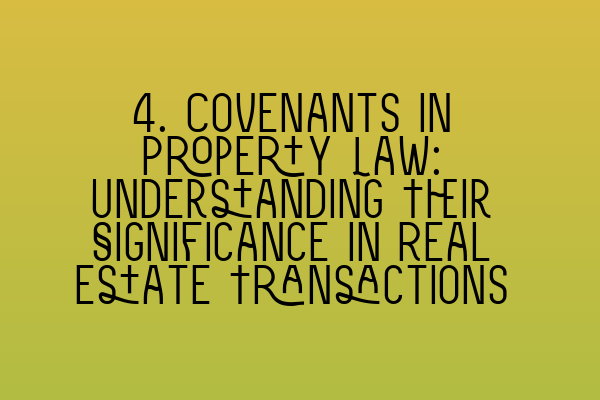Covenants in Property Law: Understanding Their Significance in Real Estate Transactions
In the world of real estate, there are various legal terms and concepts that both buyers and sellers need to be familiar with. One such concept is that of covenants. Covenants play a crucial role in property law and can have a significant impact on real estate transactions. In this article, we will explore what covenants are, why they are important, and how they are used in real estate transactions. So, let’s dive in!
What are Covenants?
Covenants are legally binding promises or agreements that are attached to a property. These promises can either be made by the current owner of the property or by a previous owner and are binding on the current and future owners of the property. Covenants are typically included in the title deeds of a property and can impose certain obligations or restrictions on the use of the property.
Types of Covenants
There are several types of covenants that can be found in property law. Some common types of covenants include:
1. Restrictive Covenants: These are covenants that restrict or limit the use of the property. For example, a restrictive covenant might prohibit the property owner from building any structures over a certain height or from using the property for certain purposes, such as commercial activities.
2. Positive Covenants: Positive covenants require the property owner to do something specific, such as maintaining the property, paying certain fees, or contributing to the maintenance of shared amenities. Positive covenants can impose ongoing obligations on the property owner.
3. Mutual Covenants: Mutual covenants are promises made by both parties involved in a real estate transaction. For example, in a lease agreement, both the landlord and the tenant may have mutual covenants to fulfill, such as the landlord providing a habitable property and the tenant paying rent on time.
Why are Covenants Important?
Covenants have a significant impact on real estate transactions for several reasons:
1. Preservation of Property Values: Restrictive covenants can help maintain and preserve the value of the surrounding properties by ensuring that certain standards and restrictions are met. For example, a restrictive covenant preventing the construction of unsightly buildings in a residential area can help maintain the aesthetic appeal and property values of the neighborhood.
2. Protecting Community Interests: Covenants can protect the interests and rights of a community or group of property owners. For example, a covenant may prohibit the use of a residential property for commercial purposes, thereby ensuring that the community remains residential and peaceful.
3. Avoiding Disputes: Clear and well-drafted covenants can help minimize disputes between property owners. By clearly outlining the rights and responsibilities of each party, conflicts can be avoided or resolved more easily.
4. Ensuring Compliance: Covenants create legal obligations on property owners, which means they need to comply with the terms and conditions outlined in the covenants. This ensures that property owners act responsibly and in accordance with the agreed-upon terms.
Using Covenants in Real Estate Transactions
When buying or selling a property, it is important to consider the covenants that are attached to the property. As a buyer, you should review the title deeds and any applicable covenants to understand the restrictions or obligations that come with the property. If there are any concerns or questions regarding the covenants, it is advisable to seek legal advice.
As a seller, you should disclose any covenants that are attached to the property to potential buyers. Transparency in disclosing restrictive covenants can help avoid future disputes and ensure a smoother transaction process.
Conclusion
Covenants play a significant role in property law and can have a lasting impact on real estate transactions. Whether you are buying or selling a property, it is crucial to understand the covenants attached to the property and their implications. Working with a knowledgeable property law solicitor can help navigate the complexities of covenants and ensure a successful transaction.
If you are preparing for the SQE 1 examination, make sure to check out our related articles on SQE 1 practice exam questions and practice mocks FLK1 FLK2. We also offer preparation courses for SQE 1 and SQE 2, which can help you in your journey towards becoming a qualified solicitor. And don’t forget to stay updated with the SRA SQE exam dates to plan your study schedule effectively.
Disclaimer: This article is for informational purposes only and does not constitute legal advice. Always consult with a qualified solicitor for expert guidance on your specific situation.
